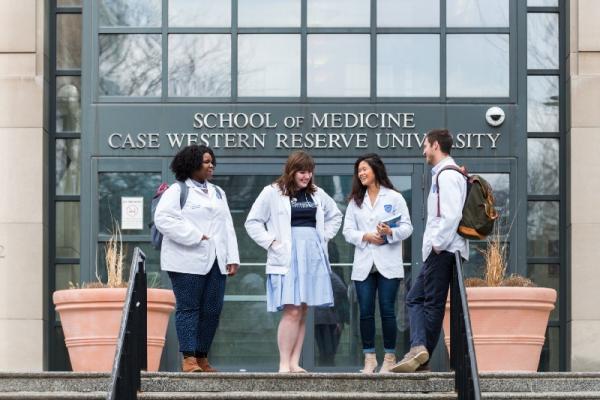February 10, 2018
Interview with Hope Barkoukis, PhD, RDN, LD
The Jack, Joseph and Morton Mandel Wellness and Preventative Care Pathway focuses on preparing students for excellence in the field of multi-dimensional and holistic wellness, equipping them with the knowledge, skills, and training to encourage healthy lifestyles for themselves and future patients.
We chatted with Dr. Barkoukis about the importance of focusing on prevention and the importance of the mind-body-spirit connection in wellness outcomes.
Q: Is there an experience you had as a health care professional that emphasized the importance of focusing on obesity prevention/healthy lifestyles?
I would say that I have a very strong clinical background. The diverse experiences I’ve had with patients of all socioeconomic statuses helped made me realize that obesity isn’t just determined by that status. Health is determined by a plethora of factors that help people sustain and achieve a healthy lifestyle. This knowledge has helped inform the skill sets we’ve identified for our students in the “Pathway.” We talk about poverty and SES but when push comes to shove, every single person struggles with a spectrum of factors that influence why they are choosing the foods and the lifestyle that they do.
Q: Why is obesity-prevention so important?
I go back to the old saying, “a penny of prevention is worth a pound of cure.” There are many downstream implications of obesity as well as chronic disease so being able to train future physicians and health care providers who will work directly with patients and train next generation is critical. We want these future health care professionals to be proactive and the only way to be proactive is focus on prevention and not just the cure.
Q: What are the major innovations or takeaways of your program?
One major takeaway is how essential to think about the mind-body-spirit connection in creating an arena of wellness — that’s why we’ve gotten future health care providers to appreciate how multidimensional and holistic wellness is. Wellness is not just about diet and physical activity because if you are emotionally and psychologically ill prepared to address your health, it’s a moot point.
Q: What’s one surprising lesson you’ve learned from this program?
Our surprise in developing the program was that we expected every medical student — because they are embarking on path of wellness — to embody what they are asking of patients. There are a significant percent of students who have the mindset that self-care is only about their patients and not about them. They feel they don’t need it for themselves, just for their patients. Maybe it’s because they’re early in their career…
Q: What’s one piece of advice for other health care provider training and education programs thinking about doing something similar?
I would encourage them to use the now-plethora of phenomenal lifestyle-medicine resources. Our curriculum took me and an RD about 300 hours to develop — but it’s been a huge group effort. Once developed, we involved 22 faculty members in teaching. We used a publication from the American Journal of Medicine that identified competencies for self-care and advocating for patients around healthy lifestyles. Our curriculum builds on these competencies. We also added nutrition and cultural competencies. It’s important to know you don’t have to totally reinvent the wheel.
Q: What’s your hope for the legacy of the program?
That it will expand. Currently we are an extracurricular activity — or an elective for medical students — but my vision is that it becomes part of the curriculum. I would also like us to leverage online technologies to bring it to scale. As a doctor, no one is going to ask you about that one enzyme pathway but you are going to have to deal with patients in mind, body and spirit. This program should be embedded into the curriculum itself.
The Jack, Joseph and Morton Mandel Wellness and Preventative Care Pathway is a winner of the 2018 Innovation Award for Healthcare Provider Training and Education. To learn more, visit innovatinghealthcare.org.


